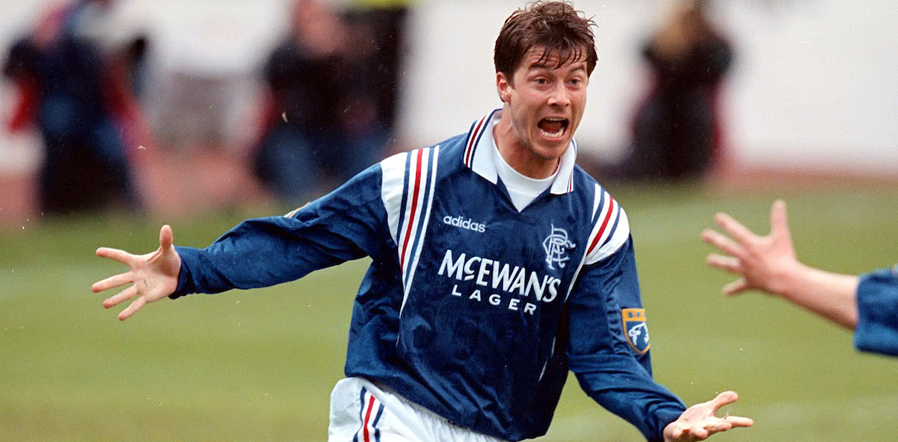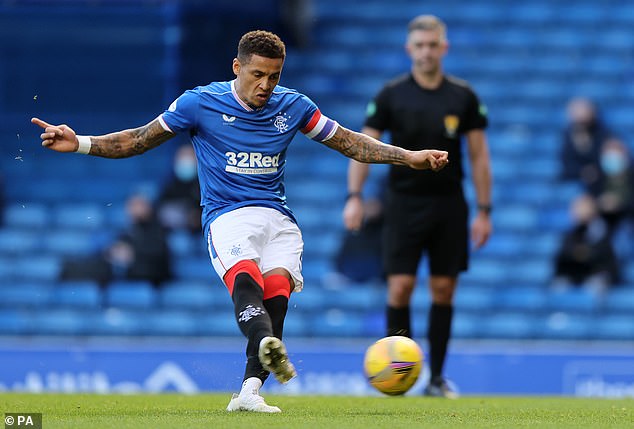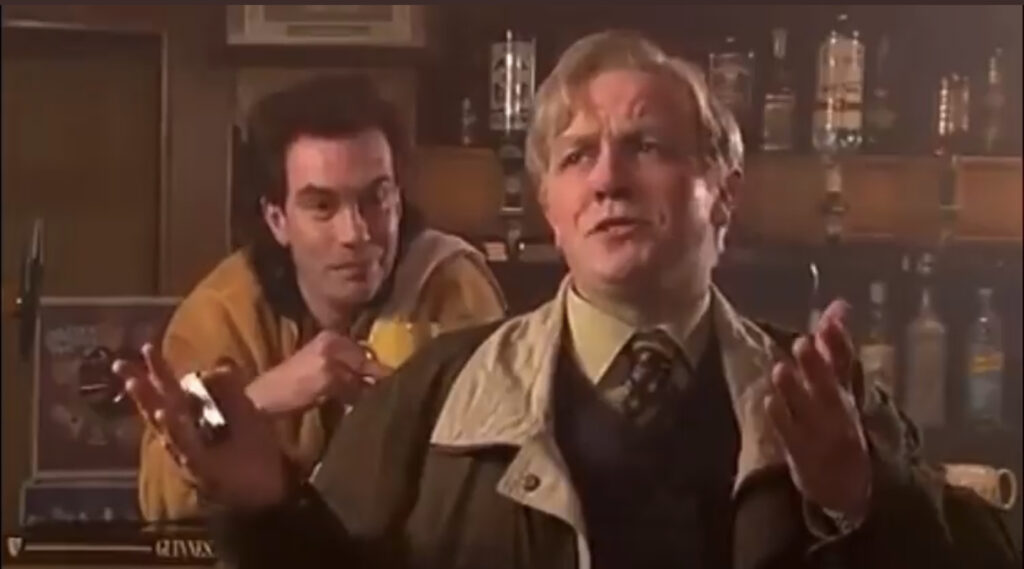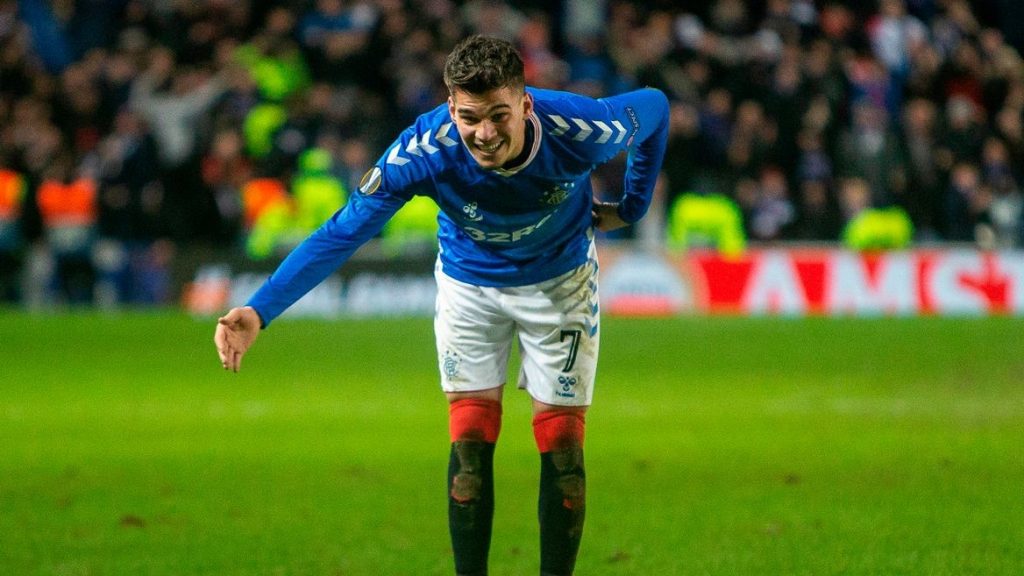By Ross Hutton
The existence of God is one of the most passionately debated topics in human history. There are many people that are adamant and vehemently opposed to the idea of such an almighty being existing while there are those that have been searching their whole life for signs that the omnipotent-one does exist. For millennium, it looked as if that debate would rage on without a conclusive answer.
That debate was settled when Brian Laudrup pitched up at Ibrox in July 1994 for the fee of just £2.3 million. Laudrup would go on to play for Rangers for four trophy-laden years cementing his place in history as one of Rangers greatest ever players and earning him the affectionate title of ‘God’ from the Rangers support.
But what made Laudrup the player that attracted he attention of Walter Smith three years before he would clinch nine-in-a-row at Tannadice? What made one of the greatest players in the world at the time join Rangers before one of Europe’s top guns? Just how did he get his absolutely magnificent hair? Well, I cant answer that but it’s some barnet isn’t it?
Ladies and Gentlemen welcome back to The Road to Rangers. Let’s talk about God.
The Laudrup’s – A Footballing Family
You cannot discuss the root of Brian Laudrup’s talent and passion for football without discussing the family from which he came. His father, Finn Laudrup, was a Danish International who made nineteen appearances for his country, scoring six goals. Laudrup Sr played primarily in Denmark but moved abroad to Austria for a spell at Wiener Sport-Cub between 1968-1970. It was during this time in Vienna that the Laudrup’s welcomed Brian into the world on 22nd February 1969. In 1970 Laudrup Sr moved back to Denmark and in 1973 moved to Brøndby, a club he would later return to in 1980 for a season helping them win promotion back to the Danish 1st Division before retiring in 1981. It was in that year that Brian’s older brother Michael would sign his first professional contract with Kjøbenhavns Boldklub.
Following in the footsteps of his wildly successful family in the footballing world was a lot of pressure to be put on Brian Laudrup’s shoulders and he admitted that he quit football at the age of 15 for a total of 10 days before returning, determined to see how far he was able to go.
To say it’s a good job that he did is an understatement. Between them, the Laudrup brothers would run European football while playing for the elite clubs on the continent. Aside from Rangers, Brian would grace the pitch for Bayern Munich, Fiorentina, AC Milan and Chelsea before ending his career at Ajax like his brother before him. While, as well as Ajax, Michael played for the likes of Juventus and both El Classico sides in a glittering career of his own. They became synonymous with a golden age of Danish football, earning them admiration and fame from around the footballing world as Raoul Simons wonderfully described in the Evening Standard:
“If Scooby Doo is the most famous Great Dane in the world, then the Laudrup brothers come a collective second”.
Brøndby is a club that the Laudrup family have a special connection to. Both brothers joined their father in playing for the club during their career, both brothers being included in the Brøndby hall of fame and Michael even returned for a successful spell as manager between 2002-2006. It was at that club in 1986, the Road to Rangers for one young Dane began.
Brøndby: 1986-1989

At the age of 17, Laudrup began his career at Brøndby after being promoted from their youth academy. Laudrup was joining the senior squad of the reigning Danish 1st Division Champions and the only full-time professional club in the country at the time, managed by his uncle Ebbe Skovdahl. Having struck up a successful partnership with Claus Nielsen (who he would later go on to play with at international level), he helped Brøndby win back to back titles in 1987 and 1988.
It was during his time at Brøndby that Laudrup broke into the Danish national side. He earned his first full cap in 1987 at the age of 18 in a 1-0 defeat to West Germany. In April 1988 he scored his fist international goal against Greece in a 4-0 win. Despite initially being in serious contention for a spot in the Danish Euro 1988 squad, he broke his collarbone ruling him out of the tournament.
Halfway through the 1988/89 season Laudrup’s contract expired and he decided it was time to move on, agreeing a deal to join German club Bayer Uerdingen for a fee of around DKK 8 million. How this fee was to be split between player and club however was a point of contention leading to a dispute between Brøndby and Finn Laudrup, who at this point was acting as his sons’ agent. It should be noted that this dispute took place roughly six years before the European Court of Justice ruled in favour of Jean-Marc Bosman and therefore free-transfers were not yet in affect.
It was ruled by the Danish Football Association that Brøndby should be paid a total of DKK 3.9 million however the dispute rumbled on when the Laudrup’s handed over DKK 3.3 million and insisted on not paying the rest of the sum. During this time there was serious discussion that Laudrup should be banned from the national team as a punishment for the dispute with Brøndby and despite the claim being settled between the Laudrup’s and Brøndby March of 1990, Brian and Michael both quit the national team after having differences with coach Richard Nielsen. Former Rangers player Jan Bartram who also played alongside Brian Laudrup at Brøndby and subsequently at Bayer Uerdigen, also quit the national side at the time because of differences with Nielsen.
Bayer Uerdingen: 1989-1990
Despite now playing in the 4th tier of German football, Uerdingen were a competitive side in the later half on the 1980s, capable of punching above their weight both domestically and in Europe. Their most notable result in that time (and arguably in their history) was a quarter final victory over Dynamo Dresden in the European Cup Winners Cup of 1986, coming back from 3-1 down on aggregate at half time in the second leg to score six goals without reply in the second half to secure a remarkable 7-3 win over the two legs.
However, by the time Laudrup joined, Uerdingen were a team hoping to survive in the league. Laudrup was asked simply to play his natural game and this is viewed as the season that Laudrup properly announced himself as one of the hottest prospects in European football. Playing in one of Europe’s top leagues, he scored 6 goals in 34 matches with 2 assists, including a brace against Hamburg in a 5-2 win. Rare footage of Laudrup’s time at Uerdingen can be found on YouTube which shows him scoring the winning goal in a 2-1 victory over FC Homburg and the link will be attached below the article. This was a season were results like this proved to be massive as Bayer Uerdingen ensued their survival in the Bundesliga on the final day of the season.
Laudrup received praise and acclimation from all corners for his displays during this season. He was ranked second (behind Werder Bremen forward Wynton Rufer) in a list of the leagues top forwards and was voted the signing of the season by a Bundesliga side. This was topped off by being voted the Danish Player of the Year for 1989.
In the summer of 1990, Laudrup sook assurances that the board were willing to strengthen the playing squad and make a push up the league table in the 1990/91 season. The board were unwilling to match the ambitions of Laudrup who decided he had outgrown Uerdingen and decided to move upwards in the footballing world.
Bayern Munich: 1990-1992
In life there are some constants that remain the same no matter the time or the era. These things include death, taxes and Bayern Munich hoovering up talented players from smaller German clubs. This was why in the summer of 1990, Brian Laudrup moved to the reigning champions of Germany for a fee of DM 6 million, making him the most expensive Bundesliga player in history at the time.
Laudrup was 21 years old and raising a young family at the time and has spoken openly about the pressure he felt to live up to the expectation and the price-tag now weighing on his shoulders:
“In Bild Zeitung, the big newspaper, every time I didn’t play well I was a six million flop and when I played well it was, ‘Well, this is what you expect for that kind of money.’ I couldn’t win”
Despite the collective disappointment with Bayern Munich finishing second in the league that season, on a personal level it should be said that Laudrup’s first season at Bayern was a success has he bagged nine goals in 33 league games, including 11 assists, meaning he had increased his all round goal contributions by 12 from the previous season having played 1 game fewer. A YouTube compilation of all 9 of his goals that season (which include some breath-taking solo efforts) can be found below the article.
Once again, Laudrup was showered with individual praise. He was voted as the most popular player in Germany by readers of the magazine Kicker by a massive margin as he received four times the votes than second place Werder Bremen striker Klaus Allofs received. Furthermore, in a vote to determine the best performers from all German national players playing abroad and all players of all nationalities playing in the Bundesliga 1 and 2, Laudrup received 24,245 votes (15.5% of the vote) coming fourth overall and coming top out of all the Bundesliga players in contention.

Because of this, Laudrup went into the 1991-92 season full of confidence and optimism for what the season held in store for him and Bayern Munich, but this season went down in infamy on both a collective and personal level. Despite starting the season well, Laudrup suffered a cruciate ligament injury in his right knee during a 2-0 away win at Dynamo Dresden in late August. This ruled him out of football until the start of February meaning he missed five full months of the season and was forced to watch on helplessly as the Bayern Munich team utterly collapses. Of the 17 league games Laudrup missed through his injury between August and February, Bayern only won 4. During his time out, Laudrup criticised Franz Beckenbauer and Heinz Rummenigge (who had both recently taken on executive roles with Bayern) for constantly lambasting the younger Bayern players in public.
He returned to the squad during a 1-1 draw away at Schalke but despite featuring in every remaining league game bar 1, the damage had been done and Bayern finished the season in 10th position.
Despite the injury and Bayern’s dismal season, Laudrup predictably received widespread acclaim for his individual performances. He won Danish Player of the Year for the second time and was voted the 5th best player in the world in the FIFA World Player of the Year poll, along with fellow countryman Peter Schmeichel. Although, that poll may have had something to do with what happened in the Summer of ’92…
Denmark National Team: European Championships 1992
Going into the summer of 1992, Laudrup’s head was in an uncertain place. Coming off the back of a season plagued by Injury in a Bayern side that had fallen apart at the seams, Laudrup wasn’t sure where his career would go next.
One thing he was sure about was that he would have time to think, at least. Despite joining back up with the Danish national side in April that year, Denmark had failed to qualify for the European Championships in Sweden having finished second in their qualification group behind Yugoslavia.
Or, so he thought.
Returning home one night, his wife Mette was waiting for him and told him she’d received a call saying that he would need to report to the Danish International Camp ASAP and that he would be going to Sweden. Just 11 days before the tournament was due to start, Yugoslavia had been suspended from all sporting competitions due to the ongoing conflict in the region. In a mad dash, UEFA decided to invite the runners up from their qualification group in their place and that team so happened to be Denmark.
It is fair to say that Laudrup was not the only one who was less than prepared for the news that in just over a week they would be playing in a group consisting of England, France and Sweden:
“A joke among the players was that we were ready for 90 minutes – 30 against England, 30 against Sweden and 30 against France. That was the joke because we had players who hadn’t played for a while. Guys had been on the beach”
The ambition of many at the time was for Denmark to get a single point as it would have surpassed the achievements of the much-heralded squad that qualified for the tournament four years previously. They go that point in their first group game against England with a 0-0 draw, and according to Laudrup they celebrated that result like they won the entire tournament.
Nobody right minded thought at that point however that in 25 days-time they would actually win the entire tournament. Nobody except the manager Richard Neilson, who after gathering the squad together for the first time told them:
“Okay Lads, let’s make it clear. We’re going to Sweden to win the competition”
According to Laudrup the entire squad bust out laughing at the ridiculousness of the suggestion. But on 26 June 1992 in Gothenburg, Denmark created history by beating a newly reunified German national team 2-0 to win their first major honour as a country. A fairy-tale game which was added to by Kim Vilfort scoring Denmark’s second goal. Vilfort twice left the training camp to visit is daughter who was suffering from Leukaemia and was twice sent back to Sweden by his family who desperately wanted him to play.

Laudrup said that before the final his Bayern Munich (and subsequently Fiorentina) teammate and German opponent Stefan Effenberg phoned him asking if he wanted to swap shirts at the end of the game. However, despite the seemingly nice gesture, Laudrup said:
“I heard on his voice [over the phone] it was just a matter of 2/3/4 nil to Germany. After the final whistle I was looking for Stefan Effenberg. Where is he? Is he ready to swap shirts? No. He left the pitch. I never saw him.”
Despite not scoring at the tournament, Laudrup played in every game (only failing to complete 90 minutes in the semi-final against The Netherlands) and was named as 1 of only 2 Danes in the team of the tournament (the other being Peter Schmeichel).
Fiorentina: 1992-1993
Returning to club duties off the back of Denmark’s Cinderella story may not have seemed the most exciting prospect had Laudrup still remained at Bayern Munich for the 1992/93 season. However, Laudrup was offered to opportunity to join Italian giants Fiorentina, who at the time were seen as strong favourites for the title.
Laudrup saw the opportunity to join what was at the time seen as the greatest league in the world as a salvation and massive step in his career. He was now playing with and against some of the greatest players in the world in a deeply competitive league.
However, this dream very quickly turned into a nightmare at Fiorentina as a boardroom change lead to an on-pitch catastrophe. Chairman Cecchi Gori had stabilised the club after a period of financial instability and began to improve the playing squad by buying talent such as Laudrup, the aforementioned Stefan Effenberg and Gabriel Batistua.
Despite a decent first half of the season, Cecchi Gori sacked the manager Luigi Radice after a 1-0 defeat at home to Atalanta. That would be one of his final acts as chairman, as he died shortly after and was replaced by his son. The consequences of this decision were catastrophic for Fiorentina as their form fell off a cliff. They only won 3 of their remaining 20 fixtures, and despite beating Foggia 6-2 on the final day of the season, they were relegated to Serie B on goal difference.
Despite this, Laudrup himself had a decent season. He managed 6 goals and 2 assists in all competitions playing a total of 34 games between Serie A and the Coppa Italia. That was on the pitch though, as anger began to grow during the season about the prospect of being relegated from Serie A after more than 50 consecutive seasons in the top-flight grew so did the danger of a backlash from the fans.
“The fans were very upset” Said Laudrup. “I wouldn’t say I feared for anybody’s life but at some point, we were told to send our families back home because they didn’t know the supporters would react. I sent my wife and son back to Denmark for the last two or three weeks of the season.”
Milan: 1993-1994

After the disaster in Florence, Laudrup was loaned to Milan for the following season. This season is one of major significance for the Rossoneri as it’s the only season in the clubs history where Milan won both the league and European cup in the same season. Under the stewardship of manager Fabio Capello, Laudrup made 14 appearances for Milan managing 2 goals. Laudrup’s game suffered somewhat in Milan for two reasons; the first being the three-foreigner rule (of which Milan had 7 at the time) and the second being Capello’s strictly defensive tactics which meant a player like Laudrup was not always needed in Capello’s tactical setup. this culminated in Laudrup being left out of the squad for the Champions League final in Athens, which saw Milan beat a star-studded Barcelona 3-0 to win their 5th European Cup.
“We won Serie A and we won the European Cup, but I never really felt that I was part of that team” Laudrup said. “I played seven games in Europe, so I did my bit. I’m proud of the medals. They’re part of my history”.
Rangers – 1994

Having stated in December 1993 that he had no intention of returning to Fiorentina after the conclusion of his loan spell with Milan, Laudrup was at a crossroads and Laudrup Sr had made it abundantly clear to his son that whatever move he made next simply had to work for him,
“He [Finn Laudrup] said that if it didn’t happen in Glasgow then maybe I was looking for something that was impossible. But I found it. At last”.
In July 1994, Rangers offered Fiorentina £2.3 million for the Danish talisman (just over £2 million less than what Fiorentina had paid Bayern Munich for his services) and the offer was accepted. On 21st July 1994, Laudrup signed for Rangers.
The rest, as they say, is history.

Clips of Laudrup on Youtube:
| Brian Laudrup winning goal for Bayer Uerdingen vs FC Homburg, 25 November 1989 – https://www.youtube.com/watch?v=q5R6zC9Cufs |
| Brian Laudrup 9 goals for Bayern Munich (1990-91) – https://www.youtube.com/watch?v=y5vyNaEu8Qw |
| Brian Laudrup, Peter Schmeicel and Richard Moller Nielson discuss Euro ’92 – https://youtu.be/pv5qoKCG1eE |
| Brian Laudrup in action for AC Milan (1993/94) – https://youtu.be/3MvY7yQHVOE |
| Brian Laudrup 9IAR goal because honestly why not? (1997) – https://youtu.be/bqy8GoPi1Qk |




